Posts Tagged ‘webservers’
Saturday, October 24th, 2020 If you had to administer some Windows webservers based on IIS and you're coming from the Linux realm, it would be really confusing on how you can use a single IP address to have binded multiple domain certificates.
For those who have done it on linux, they know Apache and other webservers in recent versions support the configuration Directive of a Wildcard instead of IP through the SNI extension capble to capture in the header of the incoming SSL connection the exact domain and match it correctly against the domain with the respective certificate. Below is what I mean, lets say you have a website called yourdomain.com and you want this domain to be pointing to another location for example to yourdomain1.com
For example in Apache Webserver this is easily done by defining 2 separate virtualhost configuration files similar to below:
/etc/apache2/sites-available/yourdomain.com
<Virtualhost *>
…
Servername yourdomain.com
ServerAlias www.yourdomain.com
….
SSLCertificateFile /etc/letsencrypt/live/yourdomain1.com/fullchain.pem
SSLCertificateKeyFile /etc/letsencrypt/live/yourdomain1.com/privkey.pem
</VirtualHost>
/etc/apache2/sites-available/yourdomain1.com
<Virtualhost *>
…
Servername yourdomain1.com
ServerAlias yourdomain1.com
…
SSLCertificateFile /etc/letsencrypt/live/yourdomain1.com/fullchain.pem
SSLCertificateKeyFile /etc/letsencrypt/live/yourdomain1.com/privkey.pem
</VirtualHost>
Unfortunately for those who still run legacy Windows servers with IIS version 7 / 7.5 your only option is to use separate IP addresses (or ports, but not really acceptable for public facing sites) and to bind each site with it's SSL certificate to that IP address.
IIS ver. 8+ supports the Server Name Indication extension of TLS which will allow you to bind multiple SSL sites to the same IP address/port based on the host name. It will be transparent and the binding will work the same as with non-HTTPS sites.
In Microsoft IIS Webserver to configure, it is not possible to simply edit some configurations but you have to do it the clicking way as usually happen in Windows. thus you will need to have generated the Domain Certificate requests and so on and then you can simply do as pointed in below screenshots.
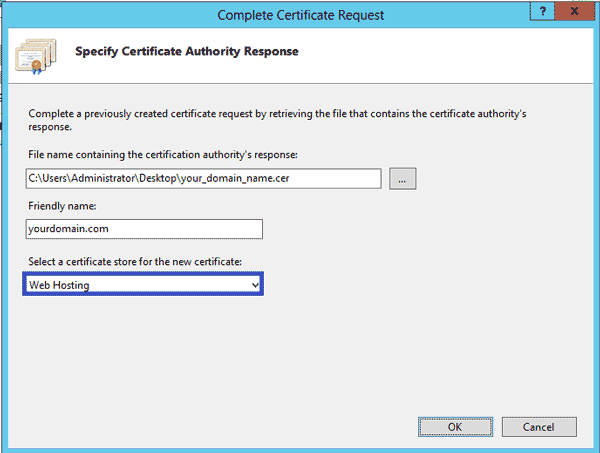
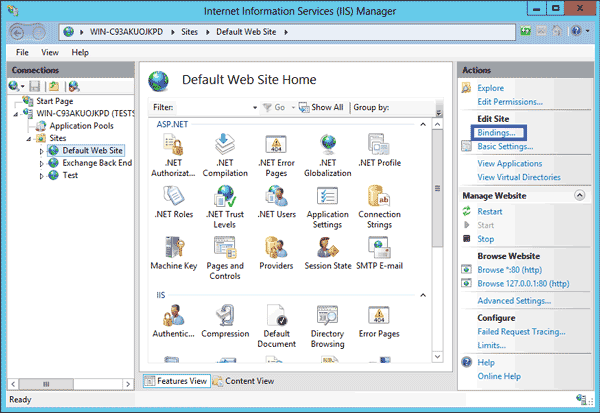
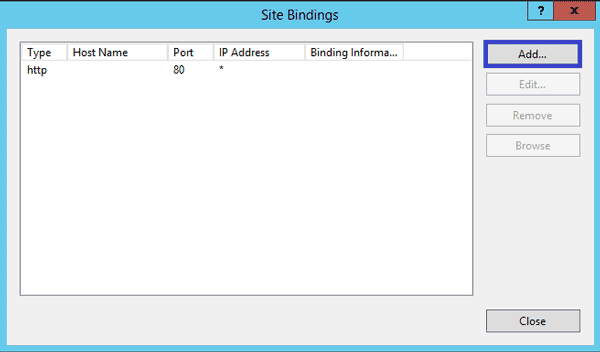
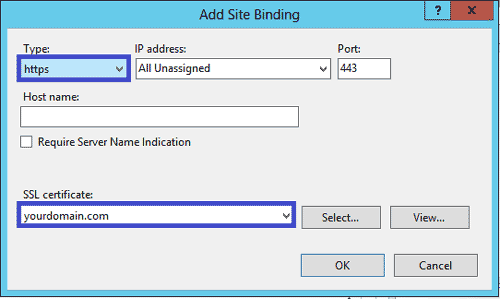
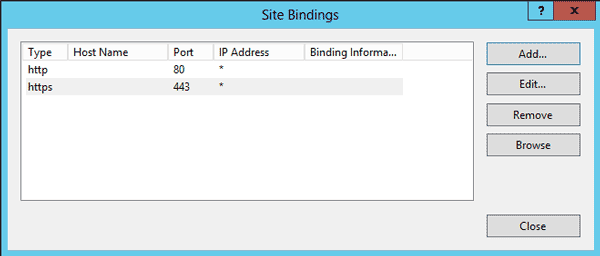
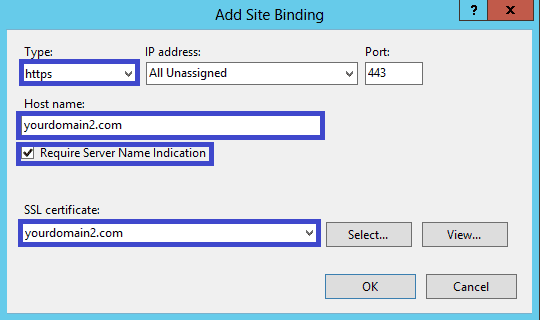
Tags: address, coming, domain certificate, IIS, pem, SSL, using, webservers, website, Windows
Posted in IIS, System Administration, Web and CMS, Windows | No Comments »
Wednesday, October 21st, 2020 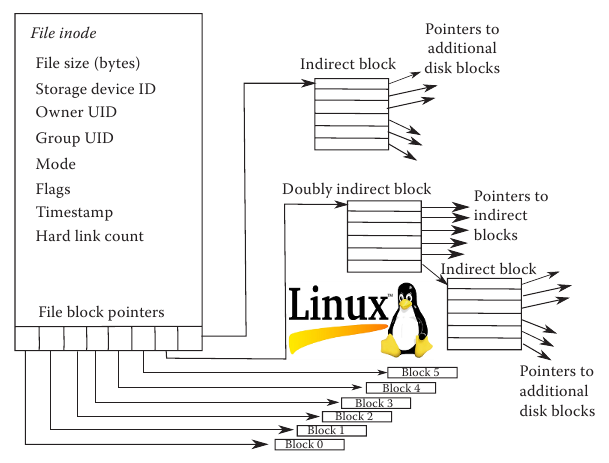
Sometimes it happens that you end up on your server with a multiple of empty files. The reason for that could be different for example it could be /tmp is overflown with some session store files on a busy website, or due to some programmers Web executed badly written PHP / Python / Perl / Ruby code bug or lets say Content Management System ( CMS ) based website based on WordPress / Joomla / Drupal / Magento / Shopify etc. due to a broken plugin some specific directory could get filled up with plenty of meaningless empty files, that never gets wiped out if you don't care. This could happen if you offer your users to share files online to a public sharing service as WebFTP and some of the local hacked UNIX user accounts decides to make you look like a fool and run an endless loop to create files in your Hard Drive until your small server HDD filesystem of few terabytes gets filled up with useless empty files and due to full inode count on the filesystem your machine running running services gets disfunctional …
Hence on servers with shared users or simply webservers it is always a good idea to keep an eye on filesystem used nodes count by system are and in case if notices a sudden increase of used FS inodes as part of the investigation process on what caused it to check the amount of empty files on the system attached SCSI / SSD / SAS whatever drive.
1. Show a list of free inodes on server
Getting inodes count after logged is done with df command
root@linux-server:~# df -i
Filesystem Inodes IUsed IFree IUse% Mounted on
udev 2041464 516 2040948 1% /dev
tmpfs 2046343 1000 2045343 1% /run
/dev/sdb2 14655488 1794109 12861379 13% /
tmpfs 2046343 4 2046339 1% /dev/shm
tmpfs 2046343 8 2046335 1% /run/lock
tmpfs 2046343 17 2046326 1% /sys/fs/cgroup
/dev/sdc6 6111232 6111232 0 100% /var/www
/dev/sda1 30162944 3734710 26428234 13% /mnt/sda1
/dev/sdd1 122093568 8011342 114082226 7% /backups
tmpfs 2046343 13 2046330 1% /run/user/1000
2. Show all empty files and directories count
### count empty directories ### root@linux-server:~# find /path/ -empty -type d | wc -l
### count empty files only ### root@linux-server:~# find /path/ -empty -type f | wc -l
3. List all empty files in directory or root dir
As you can see on the server in above example the amount of inodes of empty inodes is depleted.
The next step is to anylize what is happening in that web directory and if there is a multitude of empty files taking up all our disk space.
root@linux-server:~# find /var/www -type f -empty > /root/empty_files_list.txt
As you can see I'm redirecting output to a file as with the case of many empty files, I'll have to wait for ages and console will get filled up with a data I'll be unable to easily analyze …
If the problem is another directory in your case, lets say the root dir.
root@linux-server:~# DIR='/';
root@linux-server:~# find $DIR -type f -empty > /root/empty_files_list.txt
4. Getting empty directories list
Under some case it might be that the server is overflowed with empty directories. This is also a thing some malicious cracker guy could do to your server if he can't root the server with some exploit but wants to bug you and 'show off his script kiddie 3l337 magic tricks' :). This is easily done with a perl / python or bash shell endless loop inside which a random file named millions of empty directories instead of files is created.
To look up for empty directories hence use:
root@linux-server:~# DIR='/home';
root@linux-server:~# find $DIR . -type d -empty > /root/empty_directories_list.txt
5. Delete all empty files only to clean up inodes
Deletion of empty files will automatically free up the inodes occupied, to delete them.
root@linux-server:~# cd /path/containing/multiple/empty-dirs/
root@linux-server:~# find . -type f -empty -exec rm -fr {} \;
6. Delete all empty directories only to clean up inocommanddes
root@linux-server:~# find . -type d -empty -exec rm -fr {} \;
7. Delete all empty files and directories to clean up inodes
root@linux-server:~# cd /path/containing/multiple/empty-dirs/
root@linux-server:~# find . -empty -delete
8. Use find + xargs to delete if files count to delete is too high
root@linux-server:~# find . -empty | xargs rm -r
That's all folks ! Enjoy now your Filesystem to have retrieved back the lost inodes from the jump empty files or directories.
Happy cleaning 🙂
Tags: Delete, directories, empty, Happy, inodes, root, tmpfs, tree, udev, webservers
Posted in Everyday Life, Linux, System Administration, Various | No Comments »
Tuesday, July 1st, 2014 
In case of development (QA) systems, where developers deploy new untested code, exposing Apache or related Apache modules to unexpected bugs often it is necessery to increase Apache loglevel to log everything, this is done with:
LogLevel debug
LogLevel warn is common logging option for Apache production webservers.
Loglevel warn
in httpd.conf is the default Apache setting for Log. For some servers that produce too many logs this setting could be changed to LogLevel crit which will make the web-server log only errors of critical importance to webserver. Using LogLevel debug setting is very useful whether you have to debug issues with unworking (failing) SSL certificates. It will give you whole dump with SSL handshake and reason for it failing.
You should be careful before deciding to increasing server log level, especially on production servers.
Increased logging level puts higher load on Apache webserver, as well as produces a lot of gigabytes of mostly useless logs that could lead quickly to filling all free disk space.
If you would like to increase logged data in access.log / error.log, because you would like to perform versatile statistical analisys on daily hits, unique visits, top landing pages etc. with Webalizer, Analog or Awstats.
Change LogFormat and CustomLog variables from common to combined.
By default Apache is logging with following LogFormat and Customlog
LogFormat "%h %l %u %t "%r" %>s %b" common
CustomLog logs/access_log common
Which will be logging in access.log format:
127.0.0.1 – jericho [10/Oct/2000:13:55:36 -0700] "GET /apache_pb.gif HTTP/1.0" 200 2326
Change it to something like:
LogFormat "%h %l %u %t "%r" %>s %b "%{Referer}i" "%{User-agent}i"" combined CustomLog log/access_log combined
This would produce logs like:
127.0.0.1 – jericho [10/Oct/2000:13:55:36 -0700] “GET /apache_pb.gif HTTP/1.0” 200 2326 “http://www.example.com/start.html” “Mozilla/4.08 [en] (Win98; I ;Nav)"
Using Combined Log Format produces all logged information from CustomLog … common, and also logs the Referrer and User-Agent headers, which indicate where users were before visiting your Web site page and which browsers they used. You can read rore on custom Apache logging tailoring theme on Apache's website
Tags: common, conf, CustomLog, howto, lead, loglevel, logs, production, setting, SSL, webservers
Posted in Everyday Life, Various, Web and CMS | No Comments »
Friday, September 13th, 2013 
I haven't blogged for a while for a plenty of reasons, I'm going through a change period in my life and as any change it is not easy.
This post will be not informative and will not teach any of my dear readers, anything on Computers its pretty personal but still for my friends it might cause interest.
Here is my personal life story over the last few months …
For a while I worked in a International University College situated in my hometown Dobrich. I was hired on position of IT Manager, and actually was doing a bit of E-Marketing to try to boost traffic to College's website – www.vumk.eu and mostly helping the old school hacker ad college system administrator over the last 10 yrs – Ertan to fix a bunch of Linux Mail / SQL and Webservers and some Windows machines. In college I learned from Ertan how to install and backups of restaurants software called BARBEQUE as well as how to fix problems with billing terminals situated in College Restaurant (3rd floor of building). Other of my work time I had to fix infested Windows computers with viruses re-install Windowses and fix various printing and network problems of College's teachers, accountants, cash desk, marketing and rest of college employees.
Talking about Ertan I should express my sincere tremendous Thanks (Thanks Ertan) to it for recommending me for this job position. Right before I started work in the college I was jobless for a while starting to get desperate that its impossible find work. Current IUC sysadmin – Mr. Ertan Geldiev is a remarkable man and one of the people that made great impression in my mind. Something I found interesting I can learn from Ertan was to get from his cheerful "admin" attitude. As a true hacker Ertan had this hacker attitude of playfulness I myself has for a while lost over the years. So seeing someone like this near my life make me a good favor and had a positive influence on myself.
I have learned a lot from Ertan during the 3 months and 3 days in International University College. Just for a bit of historic information earlier IUC was known as International College – Albena, also among Dobrich citizens known as The Dutch College – as earlier IUC had good relations with Dutch Universities and was issuing double degrees both Bulgarian and Dutch. Nowadays I'm not sure if still Double-degrees partnership between IUC and Dutch Universities exist, what I know for sure is college is issuing European Double Degrees in partnership with Cardiff Metropolitan University. I myself have earlier studied in the college and already know the place well thus will use this post to say a few words on my impressions on it …
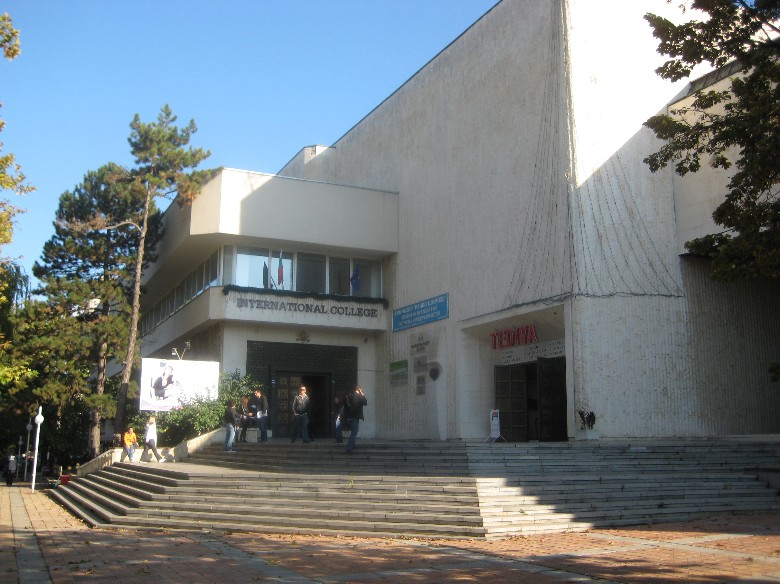
The college is a great place to be as you have chance to meet plenty of people both lecturers (professors), participate in the various events organized by College's as well as get involved in the many European Projects which are being handled by a European Projects department special department situated on the back of the College Building. Other positive about College is it is small and located on a peaceful town of Dobrich. This gives the bright people a lot of space for personal development, anyways on the other hand it can make you also a bad as Dobrich as a small city is a bit boring. The studies in College are good for students who want personal freedom as there is not too strict requirements for professors on how to teach.
Though college had help me grow, especially in my knowledge in Windows 7 and 8 (Ertan had a really good Windows background), I couldn't have the chance to develop myself too further in the long term. So my job offer to work in HP as Web and Middleware Implementation Engineer opened much broader opportunities for my long term IT career. Other reason I quit the College IT job was simply because I needed more money I had the vision to make a family with a girl from Belarus – Svetlana and in order to take care for her I need to earn good money. My official salary in the college was the funny for the position – 640 lv (though after a few months I was promised to have a raise and earn 400 EUR :)) . Such low sallary was for the reason I had the idea to continue studying in College and complete my Bachelor Business degree and we had agreed with the College CEO Mr. Todor Radev to extract part of my salary monthly and with that to pay my 1 semester tuition fee (2200 EUR) – necessary for my graduation assignment. Though completing the Bachelor is important phase to close in my life for a long time, I found for the moment more valuable to work for HP and earn normal living salary with which to possibly finance myself and create family with woman of my life (hopefully) in the short term.
In this post I want express my sincere thanks to all people in International College (Elena Urchenko, Krasimir – for helping me in my job duties), Pavel and Silvia for being a colleague for a while I worked partly in the Marketing Department.
Talking about Marketing Department what I did there is some Twitter Marketing (building some twitter followers) and wrote a tiny document with recommendation on how to optimize College website – vumk.eu (future version) – for better SEO ranking. This included complete analysis from user outlook to Indexing bots and site current code.

I have to do a big underline on how great person the College President and UNI Rector – Docent Todor Radev is. I have already bitter experience studying for a while in a government universities when younger and I know from experience usually Rectors and Universities management of state universities is pure "Hell". Thanks to Mr. Todor Radev for he did me a big favor letting me quit job just a week later (instead of 1 month as it is officially set by Bulgarian Dismissal Law and explicitly stated in my Work Contract. Also as a person my experience from Docent Radev is wonderful too. He is extremely intelligent, brilliant gentleman and most importantly open minded and always open for innovation.
As a close up I would like to say Big Thanks to everyone which I worked with or met in International University College! Thanks guys for all your support and help, thanks for being work mates and friends for the time.
Tags: 2c i, blogged, change period, european projects, hacker attitude, hewlett packard, hometown, horizons, lecturers, Linux, mail, marketing, old school, personal life story, random reasons, remarkable man, system administrator, traffic, true hacker, webservers, website www, windows machines, windows pcs, windows xp, work time
Posted in Business Management, Everyday Life, Various | 3 Comments »
Monday, March 19th, 2012 
One of the company Debian Lenny 5.0 Webservers, where I'm working as sys admin sometimes stops to properly server HTTP requests.
Whenever this oddity happens, the Apache server seems to be running okay but it is not failing to return requested content
I can see the webserver listens on port 80 and establishing connections to remote hosts – the apache processes show normally as I can see in netstat …:
apache:~# netstat -enp 80
Active Internet connections (w/o servers)
Proto Recv-Q Send-Q Local Address Foreign Address State User Inode PID/Program name
tcp 0 0 xxx.xxx.xxx.xx:80 46.253.9.36:5665 SYN_RECV 0 0 -
tcp 0 0 xxx.xxx.xxx.xx:80 78.157.26.24:5933 SYN_RECV 0 0 -
...
Also the apache forked child processes show normally in process list:
apache:~# ps axuwwf|grep -i apache
root 46748 0.0 0.0 112300 872 pts/1 S+ 18:07 0:00 \_ grep -i apache
root 42530 0.0 0.1 217392 6636 ? Ss Mar14 0:39 /usr/sbin/apache2 -k start
www-data 42535 0.0 0.0 147876 1488 ? S Mar14 0:01 \_ /usr/sbin/apache2 -k start
root 28747 0.0 0.1 218180 4792 ? Sl Mar14 0:00 \_ /usr/sbin/apache2 -k start
www-data 31787 0.0 0.1 219156 5832 ? S Mar14 0:00 | \_ /usr/sbin/apache2 -k start
In spite of that, in any client browser to any of the Apache (Virtual hosts) websites, there is no HTML content returned…
This weird problem continues until the Apache webserver is retarted.
Once webserver is restarted everything is back to normal.
I use Apache Check Apache shell script set on few remote hosts to regularly check with nmap if port 80 (www) of my server is open and responding, anyways this script just checks if the open and reachable and thus using it was unable to detect Apache wasn't able to return back HTML content.
To work around the malfunctions I wrote tiny script – retart_apache_if_empty_content_is_returned.sh
The scripts idea is very simple;
A request is made a remote defined host with lynx text browser, then the output of lines is counted, if the output returned by lynx -dump http://someurl.com is less than the number returned whether normally invoked, then the script triggers an apache init script restart.
I've set the script to periodically run in a cron job, every 5 minutes each hour.
# check if apache returns empty content with lynx and if yes restart and log it
*/5 * * * * /usr/sbin/restart_apache_if_empty_content.sh >/dev/null 2>&1
This is not perfect as sometimes still, there will be few minutes downtime, but at least the downside will not be few hours until I am informed ssh to the server and restart Apache manually …
A quick way to download and set from cron execution my script every 5 minutes use:
apache:~# cd /usr/sbin
apache:/usr/sbin# wget -q https://www.pc-freak.net/bscscr/restart_apache_if_empty_content.sh
apache:/usr/sbin# chmod +x restart_apache_if_empty_content.sh
apache:/usr/sbin# crontab -l > /tmp/file; echo '*/5 * * * *' /usr/sbin/restart_apache_if_empty_content.sh 2>&1 >/dev/null
Tags: address state, apache processes, apache server, apache webserver, apache2, apacheroot, Auto, checks, child processes, client, client browser, content, cron, Draft, enp, everything, grep, HTML, HTTP, internet connections, lenny, Lynx, nmap, oddity, program, proto, Restart, restart apache, root, script, scripts, Shell, shell script, show, spite, ss, SYN, User, Virtual, virtual hosts, webservers, weird problem
Posted in System Administration, Web and CMS | 7 Comments »
Thursday, February 22nd, 2007 I forgot I had German in the morning so I get to sleep at 3:00 a.m. In the morning my mother wake me up to ask my did I have lectures. I said yes in 10:00 then I rembembered about the German. I tried as fast as possible to stand up wash my teeths and go to the college. After the German we had some Introduction to Management classes. One of our programmers Pesho called me and said we have a problem with few of the scripts setupped to be run on crontab on one of the servers, then also the other programmer Milen called and said he had a problem with some other script which loops one of the webservers … having problems is really unpleasant. At least I’m not so sleepy as I should be for the small quantity of time I’ve slept in the night.We went to a coffee with Narf and Nomen in the lunch break after that Management again. And now I’m doing some stuff on the servers. I’m little tired now and maybe I’ll sleep. Praise the Lord for I’m spiritually okay most of the time today. Thanks God :]END—–
Tags: coffee, crontab, god, introduction to management, lunch break, management classes, Narf, nomen, programmer, programmers, scripts, servers, sleep, teeths, time today, webservers
Posted in Everyday Life | No Comments »
Monday, March 28th, 2011 
If you’re employed into an IT branch an IT hobbyist or a tech, geek you should have certainly heard about the latest trend in Internet and Networking technologies the so called Cloud Computing
Most of the articles available in newspapers and online have seriously praised and put the hopes for a better future through cloud computing.
But is really the cloud computing as good as promised? I seriously doubt that.
Let’s think about it what is a cloud? It’s a cluster of computers which are connected to work as one.
No person can precisely say where exactly on the cluster cloud a stored information is located (even the administrator!)
The data stored on the cluster is a property of a few single organizations let’s say microsoft, amazon etc., so we as users no longer have a physical possession of our data (in case if we use the cloud).
On the other hand the number of system administrators that are needed for an administration of a huge cluster is dramatically decreased, the every day system administrator, who needs to check a few webservers and a mail server on daily basis, cache web data with a squid proxy cache or just restart a server will be no longer necessary.
Therefore about few million of peoples would have to loose their jobs, the people necessary to administrate a cluster will be probably no more than few thousands as the clouds are so high that no more than few clouds will exist on the net.
The idea behind the cluster is that we the users store retrieve our desktops and boot our operating system from the cluster.
Even loading a simple webpage will have to retrieve it’s data from the cluster.
Therefore it looks like in the future the cloud computing and the internet are about to become one and the same thing. The internet might become a single super cluster where all users would connect with their user ids and do have full access to the information inside.
Technologies like OpenID are trying to make the user identification uniform, I assume a similar uniform user identication will be used in the future in a super cloud where everybody, where entering inside will have access to his/her data and will have the option to access any other data online.
The desire of humans and business for transperancy would probably end up in one day, where people will want to share every single bit of information.
Even though it looks very cool for a sci-fi movie, it’s seriously scary!
Cloud computing expenses as they’re really high would be affordable only for a multi-national corporations like Google and Microsoft
Therefore small and middle IT business (network building, expanding, network and server system integration etc.) would gradually collapse and die.
This are only a few small tiny bit of concerns but in reality the problems that cloud computing might create are a way more severe.
We the people should think seriously and try to oppose cloud computing, while we still can! It might be even a good idea if a special legislation that is aming at limiting cloud computing can be integrated and used only inside the boundary of a prescribed limitations.
Institutions like the European Parliament should be more concerned about the issues which the use of cloud computing will bring, EU legislation should very soon be voted and bounding contracts stop clouds from expanding and taking over the middle size IT business.
Tags: amazon, basis, better future, bit, cache web, Cloud, clouds, daily basis, desktops, employment, everybody, future, geek, hobbyist, identication, information, mail server, Microsoft, networking technologies, newspapers, number, openid, operating system, option, person, physical possession, Privacy, property, proxy cache, squid, system, system administrator, system administrators, think, threat, trend, web data, webpage, webservers
Posted in Everyday Life, Various | 2 Comments »

















